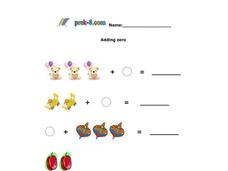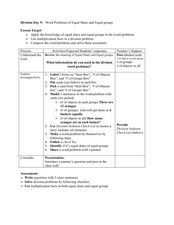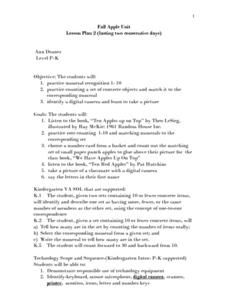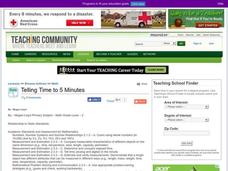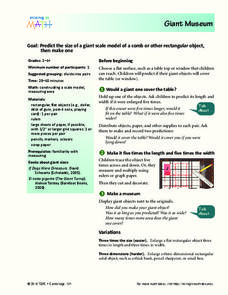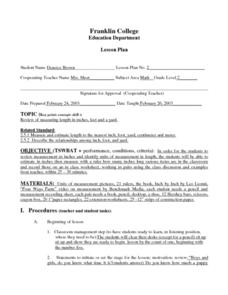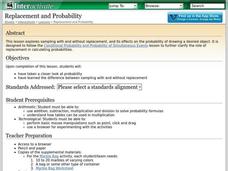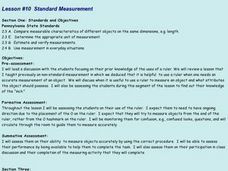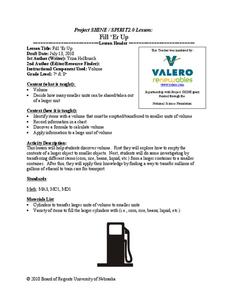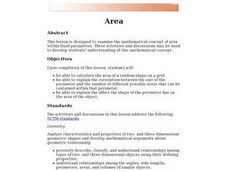Curated OER
Two 2
In this math worksheet, students practice the counting of number two with the coloring of the crayons. The objects are colored in and the skill of numeracy is increased.
Curated OER
Measuring and Identifying Trees with the Help of Technology
Students arrange themselves into small groups. Each group chooses a distance to measure ( the distance between the slide and the swings, for instance). Person #1 walks the distance, counting the number of his or her steps. Persons 2...
Curated OER
Objects in the Solar System
Eighth graders define a planet by the orbit around the sun, have a large enough gravitational force to hold a sphere shape and needs to clear the neighboorhood of it own orbital zone. They describe comets, meteoroids, meteor, meteorites...
Curated OER
Different Ways to Show Numbers homework 5.4
In this identifying numbers in different ways worksheet, students read a number, observe three choices of ways to express the number, and choose two correct ways to show the number, and then solve a word problem by writing or drawing the...
Curated OER
Adding Zero
In this addition worksheet, 1st graders focus on addition with the number zero. Students complete 4 horizontal addition problems counting the number of objects shown and adding the amount to zero before writing the total on the line...
Curated OER
Word Problems of Equal Share and Equal Groups
Explore this engaging approach to division problem solving with young scholars. They construct story problems after drawing 3 cards that give them a type of object, how many they have of that object, and the number of groups the object...
DK Publishing
Fewer Candies
Focus on the key word fewer with young counters as they draw familiar sets of objects. For each, they examine an original set (i.e. candies in a jar) and draw a set with fewer. There are nice, clear graphics and kids will enjoy the...
Curated OER
And 5 More Makes...
By drawing five more objects to existing sets, scholars begin to understand the concept of addition. They count pails and draw five more, totaling them and recording the sums. There are three of these followed by four more similar...
Curated OER
Lining Up the Cars
Students review how to count the total amount of arrangements using multiplication. Using a computer, they determine the amount of cars needed for a parade in their local community to move the town's officials. They identify any patterns...
Curated OER
Estimation & Central Tendency
Eighth graders view pictures that show many objects, estimate amount that they think they saw, and take class data from estimation to find the mean, median, mode, and range for the class.
Curated OER
Fall Apple Unit
1. practice numeral recognition 1- 10 2. practice counting a set of concrete objects and match it to the corresponding numeral 3. identify a digital camera and learn to take a picture;The students will: 1. Listen to the book, "Ten Apples...
Curated OER
Liquid Measurements
A clever visual known as "Measurement Man" is used to relate the number of units used to measure an object. Fourth graders fill in blanks with the correct numbers to show how many cups in a pint, how many quarts in a gallon, and other...
Curated OER
Telling Time to 5 Minutes
In this second grade lesson plan your class will practice telling time. The goal is to tell time to five minutes using an analog clock. Your young students count by 5 minute intervals and discuss elapsed time.
Curated OER
Teddy Bears and Friends
Children begin by making direct comparisons between objects and putting a number of objects into order according to length. They are also introduced to measuring with multi-link cubes which allows them to compare objects which cannot be...
Curated OER
Finding Volume
Sixth graders develop a rule for finding the volume of rectangular solids using colored cubes. They investigate the properties of solid figures and find the volume of an object by counting units. Students fill spaces with standard-sized...
Curated OER
Giant Museum
Scholars make a giant scale model of an object. They will take a regular item and enlarge it to five times its length and width. They attempt this same concepts with a 3D model.
Curated OER
Partitive Division
Partitive division is when you divide a set of objects equally one-by-one. This presentation shows how six items can be divided into three boxes equally. After the concrete division process is complete, the equation is shown along with...
Curated OER
Measurements - Franklin College
Second graders review measurements in inches and practice measuring different objects. As a class, they estimate various objects in their classroom and compare their estimation to the actual measurement. To end the instructional...
Shodor Education Foundation
Replacement and Probability
Middle and high schoolers explore the concept of probability. In this probability activity, learners conduct an experiment with a bag of marbles. Pupils draw marbles from a bag and determine the probability of drawing a particular color...
Curated OER
Lesson #10 Standard Measurement
Learners are introduced to units of measurement found on a ruler as well as what attributes make an object difficult or easier to measure with a ruler. The teacher has various objects placed around the room, and the youngsters practice...
Curated OER
Mean / Average
In this mean/average instructional activity, learners find the mean in three ways: one, by redrawing the objects in a set to show the mean, two, by adding the numbers and dividing by how many numbers there are and three, by finding the...
Curated OER
Fill 'Er Up
Students identify how many smaller units can be found in a later unit. In this geometry lesson, students calculate the volume and the transfer amount to a smaller unit. They solve real life problems using the formula for volume.
Curated OER
Length and Volume Exploration
Young scholars explore how to measure length and volume. They compare and order objects according to their measurable attributes and measure items using non-standard units. Students put 4 pencils in order from shortest to longest after...
Curated OER
Area Applet
Elementary math classes calculate the area of a shape and explain the correlation between the size of the perimeter and the areas that can be contained within that perimeter. They also explain the effect the shape of the perimeter has on...




